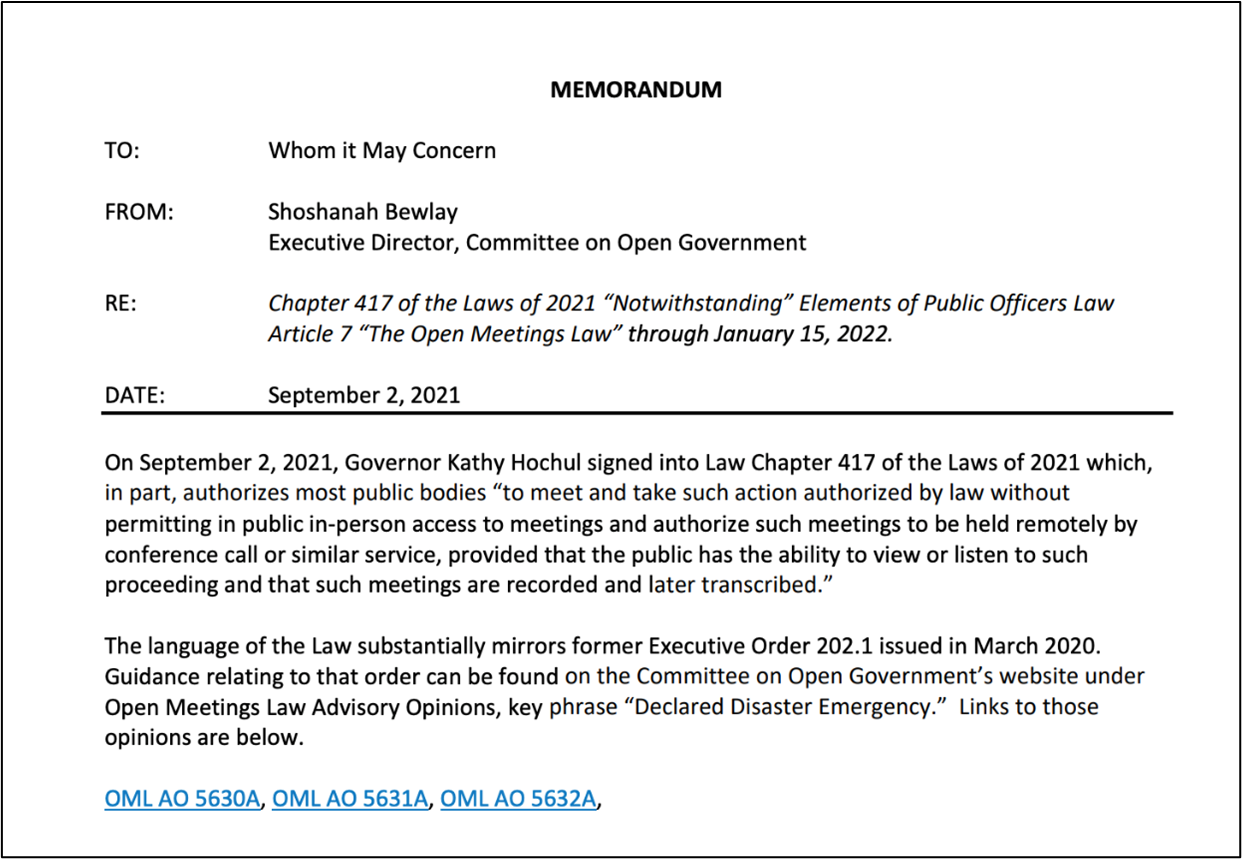Submission Date:
Question:
As you know, Governor Kathy Hochul signed legislation (S.50001/A.40001) extending virtual access to public meetings under New York State's Open Meetings Law, which allows New Yorkers to virtually participate in local government meetings during the COVID-19 pandemic.
My assumption is that library trustees will continue to be required to provide their home address or the location from where they are remotely attending the virtual meeting. Has that law requirement changed with this extension?
Answer:
Short answer
There is no requirement to disclose the location of a remote participant under the past Executive Orders or the current modification.
Long answer
I am grateful for this question since it gives me a chance to revisit an earlier answer ("Ask the Lawyer" #120) and clarify something.
The answer in "120" was based on the Executive Order(s) that temporarily modified the Open Meetings Law, allowing proceedings to be entirely virtual in the interests of safety...IF the proceedings could be seen/heard by the public, AND IF they were later transcribed.
This new law--which expires on January 15, 2022--uses legislation to achieve the same (temporary) modification.
So, if it is duplicative, what do I need to clarify?
As the member's question alludes to, before these modifications, any board member who wanted to participate remotely in an OML-governed meeting (which is any library board or committee meeting) had to disclose the address they were calling in from--because, essentially, that location was considered a "satellite" location of the meeting, where members of the public could attend.
This long-standing approach led to some interesting scenarios over the years. If the remote link was in an airport, the meeting was being conducted, partially, in an airport. Or if the remote link was in a person's living room, the meeting was being conducted, partially, in the living room. And by law and guidance, any person who wanted to physically attend the meeting at the satellite location had the right to do so...which is why the satellite location had to be included in the meeting notice.
But the modifications we are discussing changed that.
While the current guidance and commentary from the New York Committee on Open Government (the "COOG") does not say anything expressly about home addresses,[1] as I read it, neither the Executive Order nor the current legislative modification good through January 2022, require remote participants to disclose the location they are calling/zooming in from. Further, it certainly doesn't transform the location they are calling from into a "satellite" meeting location....which means, if I choose to attend from my living room, a member of the public can't, by law, demand entry.
So, if the current guidance is silent, why do I believe remote participants' addresses don't need to be provided under the modified law? While we can debate the competing virtues of physical v. virtual participation,[2] what is clear to me is that the purpose of the modifications--public safety--would be undone if every remote participant became a satellite location and was required to host the public. And if the public can't demand entry to a remote location, there is no basis to disclose its address.
In my original reply, I didn't drill this point in hard enough[3]. That is why the "short answer" above states my position plainly, and why I am grateful for this chance to clarify.
Thanks for a helpful question. May all your meetings be safe and fruitful, no matter where they occur.
[1] I am putting a screenshot of this guidance below the reply, and the live link, as of October 14, 2021, is here: https://opengovernment.ny.gov/system/files/documents/2021/09/chapter-417-of-laws-of-2021_0.pdf.
[2] Which I hope the COOG does at its next meeting, on October 19th, which I will be attending as an audience member...virtually.
[3] What I said was "While disclosing the exact location of all meeting participants may not be possible (since they will be on the phone), the notice should strive to include as much information as possible that is most useful to the public, including the location of any physical participants." That last clause should be "...including the location of the physical meeting, if there is one." This type of slip is why the profession of "editor" is still a vital job, even though the fields of publishing and journalism are changing so rapidly.

